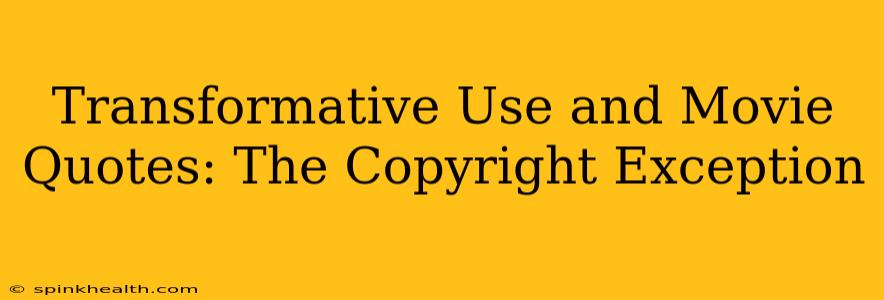Copyright law protects original creative works, including movies. But what happens when you want to use a movie quote in a book, a song, or a YouTube video? This is where the concept of "transformative use" comes into play, a crucial exception that can allow for the use of copyrighted material without permission. Understanding transformative use, particularly in the context of movie quotes, requires navigating a complex legal landscape. This article will delve into the intricacies of this exception, clarifying the conditions under which quoting a movie might be considered fair use.
What is Transformative Use?
Transformative use is a legal doctrine that allows for the use of copyrighted material without permission from the copyright holder. The key is that the new work must transform the original copyrighted work in a meaningful way. This means the new work adds something new, with a further purpose or different character, altering the first with new expression, meaning, or message. It's not just about copying; it's about adding value and creating something unique. A simple reproduction or derivative work, on the other hand, would likely infringe on copyright.
How Does Transformative Use Apply to Movie Quotes?
Using movie quotes can be tricky. Simply quoting a line verbatim might not constitute transformative use. However, using a quote within a larger work that significantly alters its context or meaning can be considered transformative. The more transformative your use, the stronger your argument for fair use becomes. Consider these examples:
-
Non-Transformative Use: Repeating a famous movie quote in a blog post without adding any analysis or commentary. This is essentially just copying, and unlikely to be considered fair use.
-
Transformative Use: Analyzing the use of irony in a particular movie quote within a scholarly article. This adds critical analysis and provides new insights, making it potentially transformative.
-
Transformative Use: Using a movie quote as the inspiration for a song lyric, significantly altering the meaning and context within the new creative work. The song's melody, harmony, and overall message change the function and meaning of the quote.
What Factors Determine Transformative Use?
Courts consider several factors when deciding if a use is transformative:
-
The purpose and character of the use: Is the new work primarily for commercial gain or non-commercial purposes? Non-commercial use is generally favored.
-
The nature of the copyrighted work: Is the work factual or fictional? The use of factual works is more likely to be considered fair use than fictional ones.
-
The amount and substantiality of the portion used: Using only a small portion of the original work is more likely to be considered fair use. However, the importance of the quoted section is also considered; a highly significant scene or line may weigh against a transformative use defense.
-
The effect of the use on the potential market for or value of the copyrighted work: Does the new work harm the market for the original? This is a crucial element. If your use could be seen as a substitute for the original work, it's less likely to be considered fair use.
How Much of a Movie Quote Can I Use?
There's no magic number. The amount used is considered in relation to the overall work. Using a single, short quote in a lengthy analysis is less problematic than using multiple long quotes in a shorter piece. The significance of the quote within the original and the new work also matters heavily.
Does Parody Count as Transformative Use?
Yes, parody is a classic example of transformative use. A parody comments on or critiques the original work through humor or satire. The use of the original material is essential to the parody, even though it is used to create a new and often quite different meaning.
What if I want to use a movie quote commercially?
Commercial use doesn't automatically disqualify a claim of transformative use, but it makes it harder to argue. You'll need a strong case demonstrating that your use adds significant value and doesn't negatively impact the market for the original work. Ideally, seeking permission from the copyright holder is always the best approach when commercial use is involved.
What are the risks of using a movie quote without permission?
Using a movie quote without permission risks a copyright infringement lawsuit, potentially leading to significant financial penalties and legal fees. Even if you believe your use is transformative, a court may disagree.
Disclaimer: This article provides general information about transformative use and movie quotes and should not be considered legal advice. Always consult with a legal professional before using copyrighted material. The legal landscape is complex and fact-specific. This information is for educational purposes only.

